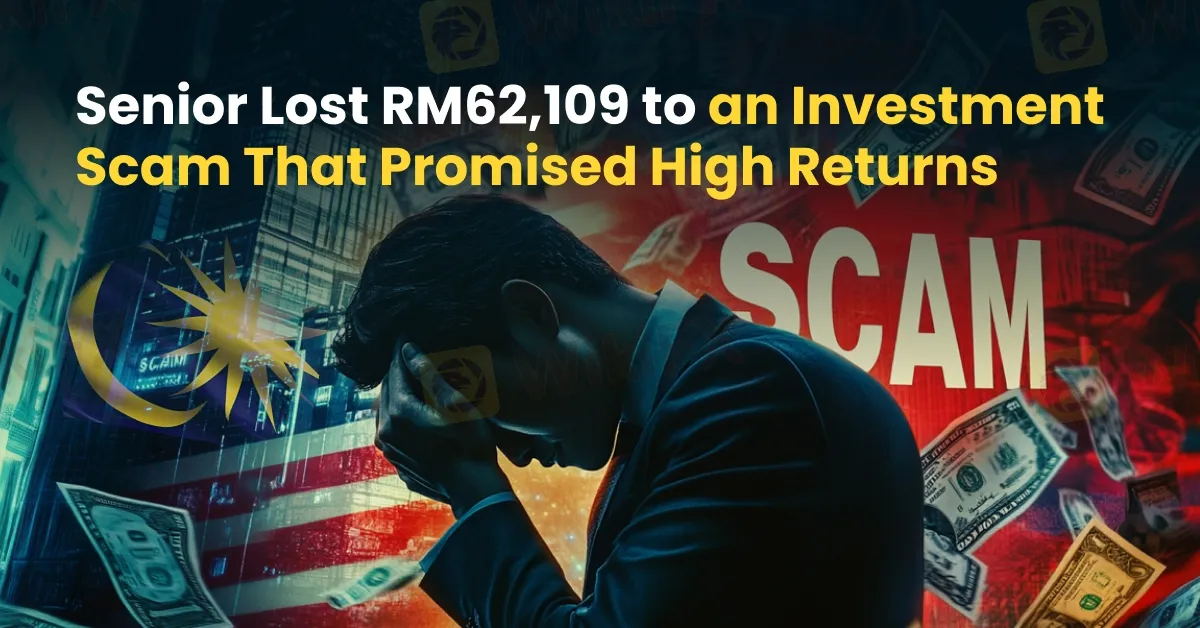简体中文
繁體中文
English
Pусский
日本語
ภาษาไทย
Tiếng Việt
Bahasa Indonesia
Español
हिन्दी
Filippiiniläinen
Français
Deutsch
Português
Türkçe
한국어
العربية
Senior Lost RM62,109 to an Investment Scam That Promised High Returns
Abstract:A 73-year-old retiree in Malaysia recently fell victim to an elaborate investment scam, losing RM62,109 after being lured by the promise of high returns.

A 73-year-old retiree in Malaysia recently fell victim to an elaborate investment scam, losing RM62,109 after being lured by the promise of high returns.
According to Kuala Terengganu police chief ACP Azli Mohd Noor, the victim was first contacted on 28 February via an unknown number. The message advertised a lucrative investment plan requiring an initial deposit of RM400, with an assurance of RM8,500 in returns within 48 hours. The seemingly attractive proposition convinced the elderly man to proceed with the initial transaction.
Following his first deposit, the fraudsters persuaded him to make additional payments, citing wages and processing fees necessary for the profit payout. Trusting the legitimacy of the scheme, the victim transferred funds from his personal savings, accumulated over years of employment at a newspaper company. In total, he conducted 18 transactions across nine different bank accounts, amounting to more than RM62,000.

The scam unravelled only after the victim realised that the promised returns never materialised. Recognising that he had been deceived, he promptly lodged a police report at the Kuala Terengganu district police headquarters (IPD) at 1 pm the following day. Authorities have since launched an investigation under Section 420 of the Penal Code, which pertains to cheating and dishonestly inducing the delivery of property.
Fraudsters often employ a common tactic: allowing victims to experience a small initial gain before coercing them into making larger deposits. By the time victims recognise the deception, they have already suffered substantial financial losses. Read this article here to understand this tactic more: https://www.wikifx.com/en/newsdetail/202503148244401400.html.

To mitigate the risk of falling prey to such scams, financial experts advise investors to exercise caution when encountering investment opportunities that promise exceptionally high returns with minimal risk. Investment offers circulated through social media, unsolicited messages, or unfamiliar sources should be treated with scepticism. Conducting thorough due diligence before committing funds is essential.

One way to verify the legitimacy of investment platforms is through regulatory and financial intelligence tools such as WikiFX. This global broker regulatory query platform provides users with detailed insights into brokers, including their regulatory status, customer reviews, and safety ratings. By leveraging such resources, investors can make informed decisions and avoid unlicensed or fraudulent entities. The WikiFX mobile application, available for free on Google Play and the App Store, serves as a safeguard against financial scams, equipping users with real-time risk alerts and data-driven assessments.

Disclaimer:
The views in this article only represent the author's personal views, and do not constitute investment advice on this platform. This platform does not guarantee the accuracy, completeness and timeliness of the information in the article, and will not be liable for any loss caused by the use of or reliance on the information in the article.
Read more

AMarkets is an Unregulated Broker | You Must Know the Risks
Think your broker is safe? Discover why AMarkets, an unregulated firm from a high-risk offshore haven, could be putting your money at risk.

Interactive Brokers Opens Nearly 24‑Hour Forecast Contracts Trading
Interactive Brokers expands Forecast Contracts trading to ~24/6, letting investors hedge or speculate on economic, policy, and climate events in real‑time.

Exnova Forex Broker Scam: Blocked Accounts, Lost Funds
Exnova forex broker slammed for scam tactics, blocking withdrawals, and dodging regulation. Victims warn of fraud risks—steer clear!

TriumphFX Rebrands to Continue Global Fraud: Over RM80 Million Lost
The notorious forex investment company TriumphFX, previously exposed for running a global scam operation for over a decade, is now being accused of rebranding itself to continue defrauding unsuspecting investors. Despite being unregulated and based offshore in Seychelles, TriumphFX has actively targeted Malaysian investors, luring them with false promises and eventually converting funds into cryptocurrency, making recovery nearly impossible.
WikiFX Broker
Latest News
Know the history of "Bank of India" before Investing — then Trade Confidently
Gold Prices Waver as Fundamentals Remain in Tug-of-War
FCA Warning List is Out: Check if Your Broker is on the List
Trading via Unauthorized Brokers? A Penalty of Up to INR 2 Lakh Awaits You!
AMarkets is an Unregulated Broker | You Must Know the Risks
How to Choose the Right VPS for Forex Trading
Markets4you Launches Global Giveaway to Celebrate 18th Anniversary
Still Falling for BotBro’s 60% Annual Forex Returns? Wake Up Before It Gets Too Late!
Webull Adds Crypto Trading Through Kalshi Partnership
Investment Scam Exposed: Deepfake Videos of Top Indian Leaders & Tech Icons misused to Lure Investor
Currency Calculator


